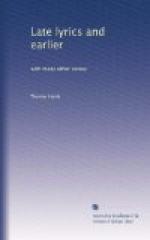But I do not now think any such temporary obstructions to be the cause of the hazard, for these negligences and ignorances, though they may have stifled a few true poets in the run of generations, disperse like stricken leaves before the wind of next week, and are no more heard of again in the region of letters than their writers themselves. No: we may be convinced that something of the deeper sort mentioned must be the cause.
In any event poetry, pure literature in general, religion—I include religion because poetry and religion touch each other, or rather modulate into each other; are, indeed, often but different names for the same thing—these, I say, the visible signs of mental and emotional life, must like all other things keep moving, becoming; even though at present, when belief in witches of Endor is displacing the Darwinian theory and “the truth that shall make you free, men’s minds appear, as above noted, to be moving backwards rather than on. I speak, of course, somewhat sweepingly, and should except many isolated minds; also the minds of men in certain worthy but small bodies of various denominations, and perhaps in the homely quarter where advance might have been the very least expected a few years back—the English Church—if one reads it rightly as showing evidence of “removing those things that are shaken,” in accordance with the wise Epistolary recommendation to the Hebrews. For since the historic and once august hierarchy of Rome some generation ago lost its chance of being the religion of the future by doing otherwise, and throwing over the little band of neo-Catholics who were making a struggle for continuity by applying the principle of evolution to their own faith, joining hands with modern science, and outflanking the hesitating English instinct towards liturgical reform (a flank march which I at the time quite expected to witness, with the gathering of many millions of waiting agnostics into its fold); since then, one may ask, what other purely English establishment than the Church, of sufficient dignity and footing, and with such strength of old association, such architectural spell, is left in this country to keep the shreds of morality together?
It may be a forlorn hope, a mere dream, that of an alliance between religion, which must be retained unless the world is to perish, and complete rationality, which must come, unless also the world is to perish, by means of the interfusing effect of poetry—“the breath and finer spirit of all knowledge; the impassioned expression of science,” as it was defined by an English poet who was quite orthodox in his ideas. But if it be true, as Comte argued, that advance is never in a straight line, but in a looped orbit, we may, in the aforesaid ominous moving backward, be doing it pour mieux sauter, drawing back for a spring. I repeat that I forlornly hope so, notwithstanding the supercilious regard of hope by Schopenhauer, von Hartmann, and other philosophers down to Einstein who have my respect. But one dares not prophesy. Physical, chronological, and other contingencies keep me in these days from critical studies and literary circles




